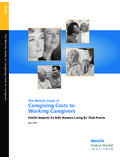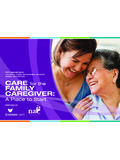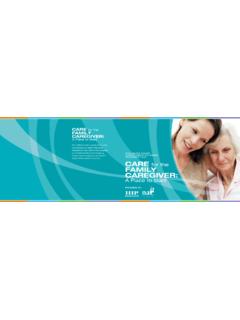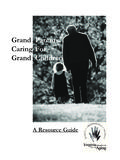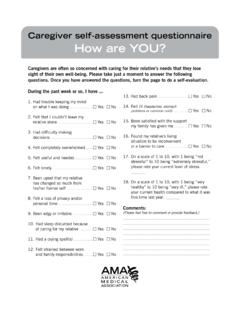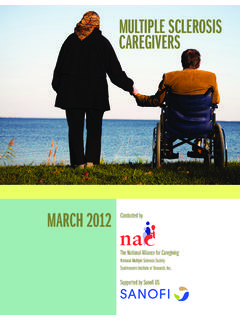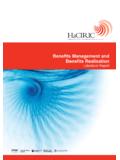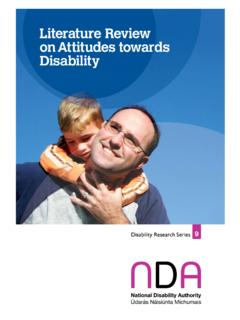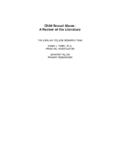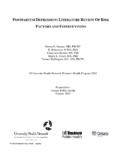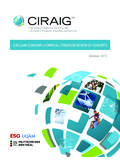Transcription of Supports for Single Parent Caregivers: Literature …
1 Supports FOR Single Parent caregivers : review OF EXISTENT LITERATUREDELIVERABLE: FINAL REPORTPURCHASE ORDER NO. HHSP233200800247 AMAY 2009 CONTRACTOR:NATIONAL ALLIANCE FOR CAREGIVINGSPONSOR:OFFICE ON WOMEN S HEALTHOFFICE OF PUBLIC HEALTH AND DEPARTMENT OF HEALTH AND HUMAN SERVICESS upports for Single Parent CaregiversEXECUTIVE SUMMARYThe Department of Health and Human Services, Office on Women s Health (OWH) contracted with the National Alliance for Caregiving (the Alliance) under contract #HHSP233200800247A to conduct a Literature review to determine what programs/ Supports exist for Single Parent caregivers . Single Parent caregivers are defined as a Single individual who is providing care for an aging or disabled family member over the age of 18 while also caring for a dependent child under the age of 18.
2 The specific activities of the project included: review of the Literature on Existent Supports for Single Parent caregivers to: Develop a profile of Single Parent caregivers ; Identify and assess gaps in programs and services offered to Single Parent caregivers ; and Recommend programs to address the needs of Single Parent requests for promising practices on caregiving listserves to: Gain a better understanding of the practices undertaken by caregiving coalitions and organizations that are designed to reach out and/or provide support to Single Parent caregiver populations. Develop a database and listing of the practices undertaken by these caregiving coalitions and on Single Parent caregivers is limited because this caregiver group tends to (1) be a secondary, smaller focus within the study of the larger caregiving population ( , a study looking at the Sandwich Generation, of which Single parents are a smaller Supports for Single Parent CaregiversLiterature Review2subset), or (2) be focused on Single parents caring for a sick or disabled dependent child with a specific illness or disability ( , a study looking at the Single parents of children with cystic fibrosis or developmental disabilities).
3 The results of this Literature review demonstrate the gaps in the Literature and highlight the need for Supports for this population. The results of the research findings were similar to the promising practices the Alliance collected from caregiving coalitions and other organizations. More often than not, the identified programs were available for all caregivers regardless of marital/partner status. Other programs provided Supports for kinship caregivers , such as grandparents caring for grandchildren. Although the majority of programs available to all caregivers also support the Single Parent , none were designed specifically to address the needs of this unique sub-population. The Alliance recommends the following actions to address the needs of Single Parent caregivers : Encourage researchers, government entities, policy makers and program planners to look more closely at the Single Parent caregiver population in order to determine what impact this group will have as the demographics of the caregiving population changes.
4 Develop resources and materials ( , a brochure, support groups, or respite program) that address best practices and information on being a Single Parent caregiver. Conduct a national survey of Single Parent caregivers to determine their specific stressors and needs. Supports for Single Parent CaregiversLiterature Overview and Purpose of the contract: The main objective of the Supports for Single Parent caregivers study was to review the Literature to determine what programs/ Supports exist for Single Parent caregivers and to document this review of Literature in a report suitable for posting to the Office on Women s Health (OWH) website. Project Background: Providing extended and/or short-term care to an aging or sick Parent , sibling, child, a person with a disability, or assisting with the care of a neighbor or friend is a reality for about 50 million Americans.
5 Serving as a caregiver to these individuals can lead to stress, depression, fatigue, lack of exercise, lack of time for family and friends, and sacrificing one s own health. According to the Administration on Aging, about million Medicare enrollees over the age of 65 received care from a paid or unpaid caregiver in 1999. In 2004 the National Alliance for Caregiving (the Alliance) and AARP published a national caregiver survey and it is estimated that over 40% of caregivers have children under the age of 18. These caregivers are referred to as the Sandwich Generation, and it is estimated that they cost the American business 11-34 billion dollars a year in terms of lost productivity. Single Parent caregivers are Single individuals who are providing care for an aging or disabled family member over the age of 18 while also caring for a dependent child under the age of 18.
6 Federal agencies have facilitated the development of a caregiver support system under the Older Americans Act, Title III: the National Family Caregiver support Program. This program assists two groups of defined caregivers . The first group consists of the adult non-paid family member who is providing informal home and community based care to an Supports for Single Parent CaregiversLiterature Review4individual over the age of 60. The second group consists of a grandparent or a relative caregiver who is over the age of 60 and is the primary caregiver to a child. The Single Parent is defined as an individual who cares for children without the assistance of another adult in the home. Little attention has been given to the needs of Single Parent caregiver and their multiple roles.
7 Although some of their needs may be met through existing programs such as the National Family Caregiver support Program, they also have unique needs that the current caregiver support system has not addressed obtaining care for school aged children when the Single Parent has to leave town if they are a long-distance caregiver, building a retirement on a part-time salary or no salary, leaving a job (temporarily or permanently) to do caregiving when they are the sole provider, etc. The Single Parent caregiver has additional challenges common to all caregivers such as navigating the maze of Federal, State, local, and private programs available to support elderly parents and children or a relative with a disability. In addition, many of the children in these households become young caregivers and assist their Parent with the care and supervision of an elderly relative or disabled sibling, which sometimes takes priority over their own education.
8 Since caregivers tend to put the needs of others before their own, they need to be educated about the importance of preventive care for themselves (pneumonia and influenza shots, mammograms and pap smears, etc.) so they will be able to continue caring for others. Objective and Scope: All plans and objectives for the contract were developed by the National Alliance for Caregiving (the Alliance) in partnership with the Office on Women s Health (OWH), the Centers for Medicare & Medicaid Services, and the Administration on Supports for Single Parent CaregiversLiterature Review5 Aging. All tasks completed were with the approval of the OWH Project Officer. The specific activities of the project included: Alliance conducted an assessment, compilation, and review of existing Supports for Single Parent caregivers in order to: Develop a profile of Single Parent caregivers ; Identify and assess gaps in programs and services offered to Single Parent caregivers ; and, Recommend programs to address the needs of Single Parent Alliance sent out e-mail requests for promising practices to caregiving listserves in order to: Gain a better understanding of the practices undertaken by caregiving coalitions and organizations that are designed to reach out and/or provide support to Single Parent caregiver populations.
9 And Develop a database and listing of the practices undertaken by these caregiving coalitions and organizations for Single Parent caregivers . a report on the results of the Literature review and e-mail request to caregiving listserves: The Alliance compiled the findings of the Literature review and e-mail requests into this report . DESCRIPTIONIt is estimated that there are million family caregivers age 18 and older in the United States (21% of the population) who are providing unpaid care to a family member Supports for Single Parent CaregiversLiterature Review6or friend. These caregivers represent an estimated million households. Of these million family caregivers , roughly 8 million ( ) are Single Parent caregivers (National Alliance for Caregiving & AARP, 2004).
10 Family caregivers represent the backbone of the long-term care system, with an estimated economic value to society of $375 billion in 2007 (AARP, 2008). Family caregivers in the are faced with many challenges as they undertake complex journeys to care for a family member or friend who needs assistance with care. Although most caregivers will report that they experience little physical strain, emotional stress, or financial hardship as a result of their caregiving role, caregivers who provide the greatest number of hours of care including personal care ( , bathing, dressing, feeding toileting and transfer) are more likely to report that they are stressed due to their caregiver role. All too often caregivers must identify and coordinate services provided by complex health and social service systems that are difficult to navigate.



